Matt Rees's Blog - Posts Tagged "global-post"
Back to diplomacy school for Israel
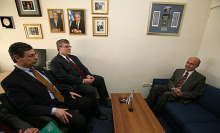 JERUSALEM, Israel — The American humorist Caskie Stinnett once wrote that “a diplomat is a person who can tell you to go to hell in such a way that you actually look forward to the trip.” In other words, someone who doesn’t make his meaning so clear that one is both afraid of the trip to hell and angry about being sent there.
JERUSALEM, Israel — The American humorist Caskie Stinnett once wrote that “a diplomat is a person who can tell you to go to hell in such a way that you actually look forward to the trip.” In other words, someone who doesn’t make his meaning so clear that one is both afraid of the trip to hell and angry about being sent there.Which makes Israel’s two top “diplomats” rather less than diplomatic.
Deputy Israeli Foreign Minister Danny Ayalon caused turmoil in relations with Turkey last week when he decided to upbraid the Turkish ambassador. Ayalon and his boss, Foreign Minister Avigdor Lieberman, wanted to let the Turks know that they found it unacceptable that a Turkish TV drama portrayed Israeli agents kidnapping children and the Israeli ambassador’s assassination.
Ayalon kept the Turkish ambassador hanging around in an anteroom, in front of cameras from two Israeli news channels. When he brought him and the cameras into his office, he sat the unfortunate envoy in a low sofa and perched stony-faced on his own, much higher chair. Between them on the coffee table stood a single Israeli flag about the size of a pocket handkerchief.
Then he turned to the cameras and said, in Hebrew: “Pay attention that he’s sitting in a low chair and we’re higher up, and there’s no Turkish flag here, and we’re not smiling.” The cameramen suggested a handshake. “No,” said Ayalon. “That’s the whole point.”
In the Oxford Dictionary I keep on my desk, “diplomacy” is described as “skill in managing international relations; adroitness in personal relationships, tact.” Perhaps Ayalon, who’s always been rather charming and intelligent when I’ve met him, ought to keep a copy on his desk. Maybe he put it in the drawer with the little Turkish flag he stands on the coffee table, when he isn’t trying to show the Turkish ambassador that he’s angry with him.
The following day, the Turkish ambassador spoke out in an interview with an Israeli newspaper. “How could he be so rude?” he said.
That was essentially the reaction in Israeli newspapers, whose journalists are no fans of Foreign Minister Lieberman, an indelicate former night-club bouncer whose burliness and Moldovan birth make him — in the eyes of the press — rather unqualified to tread the minefield of politesse that is international diplomacy.
Ayalon issued an equivocal apology after a day. But the Turks insisted on a fuller apology, which came after the Turkish president said Ankara might recall its ambassador.
“I wish to express my personal respect for you and the Turkish people,” Ayalon wrote to the Turkish ambassador, “and assure that although we have our differences of opinion on several issues, they should be discussed and solved only through open, reciprocal and respectful diplomatic channels.”
On the same day Ayalon told the Israeli parliament that because of his protest “Israel is respected more.” Presumably he means that the Turks will be satisfied with the apology but will tread more carefully in the future lest their representative find himself sinking into a low chair without a nice Turkish flag to cling onto.
Why do relations with Turkey matter so much to Israel, and why did things get so bad this week?
Turkey is a major client of Israel’s defense industries. Despite the diplo-spat, Defense Minister Ehud Barak is in Turkey for an official visit during which he’ll discuss some important new military contracts. Last month Turkey said it’d push ahead with a $190-million deal to buy drones from Israel Aerospace Industries.
Some Israeli commentators believe Lieberman and Ayalon, whose party Israel Our Home sits uncomfortably in the cabinet alongside Barak’s fractious Labor Party, engineered the tension to embarrass the defense minister.
More likely Lieberman had had enough with Turkish vilification of Israel. That began a year ago, when Turkey was one of the most outraged opponents of the war Israel waged on Hamas in the Gaza Strip. The reaction back then included a surprisingly undiplomatic outburst at the economic conference in Davos, when Turkish Prime Minister Recep Erdogan berated Israeli President Shimon Peres and stormed off the stage because the host told him it was time to end the panel and go to dinner.
Since then, Israeli diplomats maintain, Erdogan has missed no opportunity to lambast Israel. In Lebanon last week, Erdogan argued that Israel’s nuclear capability ought to be treated the same way as Iran’s nuclear program, and also said Israel threatens “world peace.”
The Israeli diplomats say the Turkish TV show was the last straw for Lieberman and provided a veiled way of punishing Erdogan for his aggressive statements.
In which case, it was actually quite diplomatic.
GlobalPost
Published on January 21, 2010 23:40
•
Tags:
avigdor-liebermann, danny-ayalon, dipolomacy, foreign-minister, foreign-relations, global-post, israel, journalism, middle-east, recep-erdogan, shimon-peres, turkey
Jerusalem Zoo: Penguins before pols
Here's a whimsical video explaining why the Jerusalem Biblical Zoo is the best vantage point from which to observe the Palestinian-Israeli conflict -- superior even than a Gaza refugee camp or an Israeli military base. Seriously. And yet not.
Published on February 11, 2010 00:55
•
Tags:
animals, arabs, crime-fiction, fish, global-post, israel, israeli-palestinian-conflict, jerusalem, jerusalem-biblical-zoo, journalism, leopards, lions, matt-beynon-rees, middle-east, palestine, penguins, politicians, politics, sara-sorcher, terrorism, tigers, ultra-orthodox-jews, video
Born Hamas, turned Shin Bet
 How the son of a Hamas founder ended up an Israeli agent, as told by the "Green Prince" himself. (I posted this on GlobalPost)
How the son of a Hamas founder ended up an Israeli agent, as told by the "Green Prince" himself. (I posted this on GlobalPost)RAMALLAH, West Bank — Parents often lament that their kids don’t follow them into their chosen professions. They ought to think themselves lucky. They could be Sheikh Hassan Youssef, a founder of the Islamic militant group Hamas whose son converted to Christianity and became a key Israeli agent.
Mosab Hassan Youssef, 32, reveals his secret life in a book published this coming week “Son of Hamas: A Gripping Account of Terror, Betrayal, Political Intrigue, and Unthinkable Choices” (Salt River Press).
A few days ago on his Facebook fan page, Youssef announced that he’d given an interview with the Israeli newspaper Ha’aretz about the contents of the book. “The story will blow your minds away, it is going to be like a tsunami in the Middle East, couple of days later it will spread like a wild fire,” he wrote.
The tsunami was that Youssef’s previous account of his struggles — that he had turned against the violent ways of Hamas and, consequently, rejected Islam as a religion of hatred and violence — wasn’t the whole story. In fact, Youssef had been an agent for the Israeli Shin Bet domestic security service during the intifada, informing on the very organization of which his father, Sheikh Hassan, was a prominent leader.
His actions earned Youssef the codename “Green Prince” from the Shin Bet, a reference to the Islamic green of Hamas’s flags.
The account in Ha’aretz was verified by Gideon Ezra, an Israeli legislator who’s a former deputy chief of the Shin Bet.
Youssef’s father was a founder of Hamas and is currently serving a six-year sentence in an Israeli jail. The younger Youssef has said that he turned against Hamas when he realized that his father, who’s seen as a relative moderate, didn’t represent the heart of the organization. Youssef saw that core as rotten with a self-destructive hatred that brought down disaster on the Palestinian people.
Sheikh Youssef’s reputation as a moderate, of course, doesn’t preclude him giving fiery speeches about the victory of Islam in battle — which I witnessed several times at his mosque in al-Bireh, a city abutting Ramallah.
The sheikh’s broad white mosque with its plain carpeted floors is a long way from the Barabbas Road Church in San Diego, Calif., where Mosab Youssef now worships.
In 2005, the last time I saw Sheikh Hassan during the intifada, he claimed that as a representative of Hamas he was in contact with U.S. diplomats via a European intermediary. “And I know that what I tell the Americans they will tell Israel,” he said, “so, yes, I’m talking to the Israelis.”
In Hamas, that makes him pretty moderate.
The following week, Sheikh Hassan was arrested by the Shin Bet (with the aid of his son, it turns out).
In prison, according to Mosab Youssef, his father was devastated by the news that his son had become a Christian. The sheikh refused to disown his son, however, because that would imply consent to the boy’s murder.
Former Shin Bet deputy chief Ezra said Mosab Youssef was recruited as an agent while being held in an Israeli jail. Ezra, like several anonymous Shin Bet sources quoted by Ha’aretz, said Youssef’s information helped prevented numerous suicide bombings and saved many Israeli lives.
Most Palestinian informers — or collaborators, as Palestinians call them — are recruited either in jail or when they visit Israeli military bases to obtain travel permits. The collaboration begins with something small and apparently harmless, in return for permission to travel through army checkpoints for medical treatment in Jerusalem, say. By the time the Palestinian realizes he’s a fully fledged collaborator, the Shin Bet are able to control him by the threat of exposure.
In Mosab Youssef’s case, no such threats were needed, it seems. In the Ha’aretz interview, he expresses a desire to be in Gaza so that he could secure the release of Gilad Shalit, the Israeli soldier held hostage there, and end the suffering of Gaza’s people under the Hamas regime.
A Hamas leader, Ismail Radwan, denounced the report as an attempt to undermine Sheikh Youssef’s standing. "The Palestinian people have great confidence in Hamas and its struggle and they will not be fooled by this slander and these lies of the Israeli occupation," he said.
Published on February 26, 2010 04:42
•
Tags:
california, collaborators, crime-fiction, global-post, green-prince, hamas, informers, intifada, israeli-agent, israeli-intelligence, middle-east, mosab-hassan-yousef, ramallah, san-diego, sheikh-hassan-yousef, shin-bet, west-bank
The war Israelis and Palestinians plan
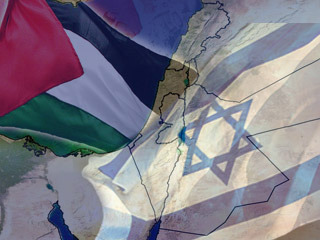 I posted this on Global Post. JERUSALEM — There’s an old Arab aphorism: “A man with a plan takes action; a man with two plans gets confused.” Apply that to the Israelis and to the Palestinians, and the nonsensical sequence of recent events in the Middle East starts to fall into a comprehensible pattern.
I posted this on Global Post. JERUSALEM — There’s an old Arab aphorism: “A man with a plan takes action; a man with two plans gets confused.” Apply that to the Israelis and to the Palestinians, and the nonsensical sequence of recent events in the Middle East starts to fall into a comprehensible pattern.It’s not a pleasant pattern, because it leads to war.
First, before we get to the fireworks, let’s recap all the nonsense.
The Palestinians refused to talk to the Israelis from December 2008, when a relatively centrist Israeli government made a peace offer the Palestinians rejected. Since then, small economic reforms and big U.S. security aid have made life in the West Bank fairly free of violence. Better, for sure, than life in Gaza, which is still a mess more than a year after the Hamas-Israel war there.
Israelis elected a center-right-dominated parliament a year ago, and Benjamin Netanyahu formed a rightist cabinet. He refused to halt building in Israel’s West Bank settlements, as President Barack Obama demanded. Even when forced by Washington to put a transparently fake freeze on construction he declined to include East Jerusalem.
The Palestinians wouldn’t restart direct peace talks until there was a freeze on the Israeli neighborhoods of East Jerusalem. So the Americans eventually persuaded them to have indirect talks. Without much enthusiasm, the Palestinians agreed.
Why no enthusiasm? Leading Palestinians, including chief negotiator Saeb Erekat, had already started to talk about a new failed round of talks leading quite simply to a “one-state solution.” That means, no division of the land, just a single state in what’s now Israel, the West Bank and Gaza. One adult, one vote. Soon enough, of course, that means no Jewish majority and the end of Israel as a Jewish state.
Meanwhile, Israel largely escaped the financial crisis of the last two years and its citizens spend little time fretting about the Palestinians. In Tel Aviv, the discovery of old bones by workers building an underground emergency room for a hospital led last month to an attempt by ultra-religious politicians to block the construction, and protests by locals who cried out against religious coercion.
No such mass protests against continued building in the settlements. That proceeds, even to the extent that during the last month announcements of new construction in East Jerusalem have caused a major crisis in relations with Washington. In one case, the planned building of a mere 20 apartments in an Arab neighborhood of East Jerusalem forced Obama to take time out of his undoubtedly busy day to discuss it with Netanyahu.
There’s more nonsense, but let this much suffice for now.
Back to the Arab aphorism. Who has a plan, and who’s confused?
It’s clear that most Israelis and most Palestinians are living in denial — a kind of confusion, because it takes the illusion of current calm for a sustainable and welcome period of peace.
Israelis know the settlements can’t go alongside a two-state solution, but they don’t choose one or the other.
Palestinians know that the way to stop the settlements eating up the hilltops around their towns is to strike a deal now and rule their own state, but they won’t do it so long as life is relatively good and the international pressure is all on Israel. Leaders of Fatah and Hamas have called for a “third intifada” several times in the last four months — not for renewed talks, only for renewed violence. But a mere handful of kids came out to throw rocks and Molotov cocktails.
With no sense of urgency on either side, Western diplomats shake their heads and try to nudge the two nations to the negotiating table. It’s time to realize that neither side wants talks.
While most Israelis live in denial, a sizeable minority pushes for more building in the West Bank and East Jerusalem. They’re not building so that they can later give up that land and see all the money they’ve pumped into their real estate wasted. The purpose is to make the West Bank inseparable from Israel. To kill the two-state solution.
In that scenario, either the Palestinians agree to be second-class inhabitants of the area -- fat chance -- or they leave. Well, with a little nudge.
On the Palestinian side, negotiations seem unlikely to lead to the satisfaction of every single demand. So the one-state solution starts to look good to them, too. However, second-class citizenship isn’t an option, and neither is leaving.
That’s the collision course Western diplomats refuse to countenance. When envoys talk about getting the “peace process on track,” it sounds good. But that process has been trucking along since the early 1990s. Peace has been getting further away. The “process” allows for a sense of activity, while all the time events — settlement construction, terror attacks — make it harder to draw lines on a map and make the populations secure.
It’s time to figure out a new diplomatic strategy to deal with the Israelis and Palestinians. One that’s based on the assumption that, in the longterm, they’re expecting war.
Published on April 06, 2010 02:02
•
Tags:
arab, barack-obama, benjamin-netanyahu, conflict, crime-fiction, east-jerusalem, fatah, gaza, global-post, hamas, intifada, islam, israel, israelis, jerusalem, jews, journalism, middle-east, palestine, palestinians, settlements, tel-aviv, war
Hamas rebuilds in West Bank
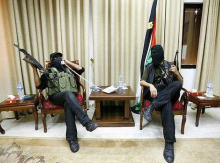 Hamas is steadily rebuilding its power in the West Bank, stockpiling weapons and material underground, biding its time for a renewal of the conflict with its Fatah rivals.
Hamas is steadily rebuilding its power in the West Bank, stockpiling weapons and material underground, biding its time for a renewal of the conflict with its Fatah rivals.Palestinian security officials have been telling me this for some time, and they are frankly filled with fear and foreboding. Palestinian President Mahmoud Abbas mentioned it again in an interview with the Arabic newspaper al-Sharq al-Awsat during the week, accusing Hamas of smuggling weapons to the West Bank.
The Hamas buildup is one of the reasons Abbas has allowed his independent prime minister, Salaam Fayyad, to stay in his job so long, despite the popularity Fayyad is accruing at the expense of Abbas’s Fatah. Fayyad has managed to reform the Palestinian security forces, persuading the U.S. to give tens of millions of dollars in security aid.
Without those reforms, the Palestinian security forces would either fold in minutes if faced with a Hamas uprising in the West Bank, or would even join Hamas to save themselves.
So it’s significant that after 10 days in which Abbas repeatedly berated Fayyad’s plan to declare a Palestinian state in 2011 — which would convince the world that if Fayyad could create a state, Fatah might’ve become irrelevant and therefore not worth the cash it siphons away — the president also highlighted the urgency of Fayyad’s most important achievement. (He first talked about it in an interview with a Kuwaiti newspaper in January, when he said he had “verified information” that Hamas planned to take over the West Bank by force.)
Of course, U.S. and European security advisers to the Palestinian security forces don’t claim to have made much of their new charges. If Hamas is able to recreate its West Bank network, the Palestinian security forces will hold up their advance for only about a week, they estimate.
That’s not bad, given that two years ago the Palestinian security forces were good for nothing much at all. A week might also buy time for a cease-fire, which might in turn preclude an Israeli invasion of the West Bank — it’s unimaginable that the Israelis would allow the West Bank to come under Hamas control.
Part of Abbas’ accusation against Hamas is that its leadership is allowing radical young military leaders to blow off steam by plotting a West Bank armed takeover. In return, those military leaders aren’t pushing as hard for rocket attacks against Israel from Gaza.
The Hamas leaders in Gaza are keen to avoid such attacks, because they’re barely recovering from the hammering they received a year and a half ago at the hands of the Israeli army. The cause of that war, remember, was rocket attacks from Gaza into Israel.
Hamas kicked Fatah out of the Gaza Strip in 2007. Fatah people were shot and tortured, and a few were tossed from tall buildings. Since then, both sides have engaged in a low-flame civil war which involves lengthy detentions without trial, torture and kneecappings.
The West Bank looks like an attractive playground into which Hamas can shove its angrier military types. After all, if the Fatah cops fail to intercept a Hamas attack against Israelis in or from the West Bank, Israel usually blames Fatah rather than Hamas.
Within the Izzedine al-Qassam Brigades, the Hamas military wing, support has been increasing for more militant action — yes, more militant than the leadership which ultimately wants to eradicate Israel but is prepared to wait a long time to do so. (In Gaza, that counts as dovishness...)
Those military leaders have turned, according to international analysts, to a brand of Islam more commonly called “Salafi.” In short, it’s the extreme Islam favored by many in the Gulf States. It’s quite alien to most Palestinians, who are conservative but not particularly fundamentalist in their religion. Still, once a military type gets stirred up, the hard line often looks appealing.
Abbas better hope he hasn’t leaned too hard on Fayyad. The week of grace his prime minister’s reforms will have bought him in the event of an attempted coup by Hamas might prove to be the difference between a nice retirement at his house in Dubai and the kind of kangaroo justice meted out by the Islamist in Gaza three years ago.
(I posted this on Global Post.)
Published on May 09, 2010 23:09
•
Tags:
abu-mazen, crime-fiction, dubai, fatah, gaza, global-post, hamas, intifada, israel, israeli, izzedine-al-qassam-brigades, mahmoud-abbas, middle-east, palestine, palestinians, plo, salaam-fayyad, salafi, sharq-al-awsat, west-bank
Israel prepares for next threat--nuclear?
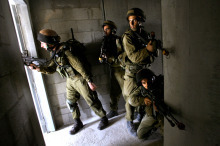 NABLUS, West Bank — During the Palestinian intifada, I sat on a dusty hilltop overlooking this most violent of West Bank towns with a dozen of the top Israeli officers in the area. The brigade commanders told their regional chiefs that all the police work and house-to-house fighting of the intifada had made their troops ill-prepared for a real war. “If we had to fight in Lebanon, my men wouldn’t know what they were doing,” shouted one.
NABLUS, West Bank — During the Palestinian intifada, I sat on a dusty hilltop overlooking this most violent of West Bank towns with a dozen of the top Israeli officers in the area. The brigade commanders told their regional chiefs that all the police work and house-to-house fighting of the intifada had made their troops ill-prepared for a real war. “If we had to fight in Lebanon, my men wouldn’t know what they were doing,” shouted one.In 2006, that prediction was proven largely true, as Israeli forces were matched on the ground by Hezbollah’s militia. The air- and missile-warfare that went on over their heads was devastating to Lebanese and Israeli civilians, but Israel’s military planners were shocked by the difficulties faced by their ground troops.
For Israel, the threat these days is clear. Nablus is quiet, its gunmen subdued by Palestinian police who are trained with American help and the economy bolstered by American aid. This week, Israeli soldiers will run through a series of exercises to practice for a potential conflict with Hezbollah on the country’s northern border.
The main unknown in those exercises: How long does Israel have before the threat of nuclear attack will come into play?
Israeli government officials and security chiefs are reluctant to talk about how Israel might respond if Iran succeeds in obtaining nuclear weapons. They prefer to emphasize the destabilization of the international balance of power should such a situation arise. “We should focus on prevention,” Intelligence Minister Dan Meridor told international journalists last week. “Prophylactics, rather than dealing with unwanted results.”
So the disdain in Jerusalem was absolute for the Turkish-Brazilian deal announced last week under which Iran would ship some of its uranium to Turkey. To use Meridor’s biological analogy, that was about as much use as a prophylactic with a big hole in it. The Iranians were playing for time, Israeli officials said, and the United States was right to override the deal and go for strong sanctions.
Trouble is, most Israeli officials don’t expect those sanctions to work any more. Israel is starting to come to terms with a burgeoning Middle Eastern nuclear arms race. It will start the race with a lead — it has had nuclear weapons for four decades. But with Iran coming up on the rails and Saudi Arabia and Egypt, unwilling to be potentially threatened by Tehran, soon joining the competition, the dangers to the Jewish state are considerable.
It’s de rigueur for international strategists to say that Israel isn’t the country that should be most worried by Iranian nuclear ambitions. Instead, they posit the Gulf states, Shia Iran’s Sunni Muslim rivals, as the most at-risk.
There’s something to that. Yet Iran’s biggest success in exporting Islamic Revolution has been through Hezbollah in Lebanon. It also now has a direct line to Gaza with Hamas, which it helps to bankroll. Both would be easy places from which to use nuclear capability to influence regional — or even world — events.
Israel’s response to the Iranian move toward nukes is complicated. Its actions are limited. A potential aerial attack on Iran’s nuclear facilities would be difficult without bunker-buster bombs or coordination with the U.S. and the Arab countries over which Israeli jets would have to fly.
Diplomatically, Israel has little faith that sanctions can do anything more than delay an Iranian bomb. Why? Because it has experience of its own in negotiating about an issue so long that its negotiating partner in the end accepts a sliver of what it had originally asked for — and even then the negotiations can start again without reference to previous deals.
That’s a familiar tactic in Jerusalem, which has frequently confounded Western negotiators. Just as Iran has infuriated Washington with the sanctions issue, agreeing to something when total breakdown seemed imminent and pulling back just before it was required to act.
In public, at least, Israeli officials are forced to push for stiff sanctions, as if they thought that'd make a difference. But rather than believing Iran’s nuclear program will be ended, they view the sanctions as a way of buying time for Israel to prepare its troops exercises like those this week and to ready more advanced missile defenses.
Congress this week voted for President Barack Obama’s plan to give $205 million to Israel to fund its short-range missile defense system. That’s vital to Israel now, given Hamas’ rockets in Gaza, which have Tel Aviv in range, and Hezbollah’s ability to hit any place in Israel with some of its 42,000 missile arsenal. But it will only be more important once the equation has a nuclear component.
(I posted this on Global Post.)
Published on May 23, 2010 01:46
•
Tags:
brazil, crime-fiction, dan-meridor, gaza, global-post, hamas, hezbollah, iran, israel, israeli-army, israelis, jerusalem, journalism, lebanon, middle-east, nablus, nuclear-weapons, palestine, palestinians, tehran, turkey, west-bank
How to keep up on the Middle East
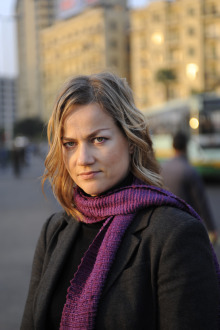 JERUSALEM — Time was anyone with an interest in the Middle East could be guaranteed a couple of books a year would be brought out by U.S. journalists based in the region. Now many of those correspondents are history, with news bureaus closing and those that remain cutting back. The new books written by Americans tend to be by think-tank types or others whose agenda is hard to figure out.
JERUSALEM — Time was anyone with an interest in the Middle East could be guaranteed a couple of books a year would be brought out by U.S. journalists based in the region. Now many of those correspondents are history, with news bureaus closing and those that remain cutting back. The new books written by Americans tend to be by think-tank types or others whose agenda is hard to figure out.But you know that already. It’s one reason you’re reading GlobalPost, which was founded partially to replace the disappearing corps of U.S. foreign correspondents. [That's where I first posted this.]
So GlobalPost has solved your journalism problem. But, still, what’re you going to do about the books? With a book written by a foreign correspondent you couldn’t always be sure of a good read —I’ve ploughed through some stinky “notebook dumps” in my time by reporters who padded pages with meaningless tales of their Palestinian and Israeli “friends” — but you at least knew that it was by a responsible journalist answerable to editors and readers even for his extracurricular writings. Not so with think-tank academics whose financing and agenda can make for deeply skewed accounts.
The answer: Europeans. A new book demonstrates what I’m talking about.
“Hold onto Your Veil, Fatima!” is an expose of contemporary Egypt that’s at once harrowing and humorous by Sanna Negus, a reporter for Finland’s YLE Radio and TV.
Negus came to the Middle East in the mid-1990s for graduate studies in Cairo, largely because she wanted to learn an unusual language and figured Arabic fit the bill. (It’s not as unusual as Finnish, but then she already had that covered.) She returned to Cairo, working for the English-language Cairo Times and staying for a decade as YLE’s correspondent. She’s been based in Jerusalem the last two years. (Lawrence Wright, who won a Pulitzer for “The Looming Tower: al-Qaeda and the Road to 9/11,” writes in the book’s foreword that Negus is “one of the most informed and well-connected reporters in the region.”)
Read the rest of this post on my blog The Man of Twists and Turns.
Published on June 20, 2010 03:16
•
Tags:
9-11, american-colony, cairo, cairo-times, crime-fiction, egypt, female-circumcision, finland, genital-mutilation, global-post, hold-onto-your-veil-fatima, israe, jerusalem, journalism, lawrence-wright, middle-east, middle-east-books, pulitzer-prize, sanna-negus, the-looming-tower, time-magazine, women
Israel Museum gets funky
 I was the first journalist to interview James Snyder when he arrived in 1997 from a sinecure at New York's Museum of Modern Art to head the Israel Museum, the country's premier cultural institution.
I was the first journalist to interview James Snyder when he arrived in 1997 from a sinecure at New York's Museum of Modern Art to head the Israel Museum, the country's premier cultural institution.Snyder had neat white hair, a trim build encased in a seersucker suit, and a black tie. This, in a land where dressing up means putting on a T-shirt that has sleeves. As I listened to his East Coast drawl, I took one look at him and figured he wouldn’t last.
Devotees of the Israel Museum can be thankful I was wrong. Snyder just completed a $100-million renovation of the museum, transforming a much-loved but confusing jumble into a sleek, user-friendly building.
After three years in which visitors could, more or less, only see the Dead Sea Scrolls and a large model of Jerusalem in the time of Herod’s Temple (still at the full entrance price), the museum reopened its full collection last week. The flashy redesign has attracted masses of Israelis and foreign tourists without making the place seem overcrowded.
The new museum sticks with the general features of the older building, which was designed in the late 1950s and inaugurated in 1965. A series of modernist cubes, the old building was arranged along the ridge above the 11th-century Monastery of the Cross, and beside the Knesset, Israel’s parliament. The original designer, Alfred Mansfeld, intended the museum to blend with its landscape, like an Arab village.
Unfortunately, Mansfeld also had the idea of making visitors walk the entire length of the museum — uphill, a distance equal to four stories, and outside in a city that sits in a desert and is quite hot nine months of the year — before they could enter. The walk was, to say the least, unpopular. Particularly because when you got to the top, you had to go down some stairs to enter the galleries.
Read the rest of this post on my blog The Man of Twists and Turns.
Published on August 04, 2010 06:30
•
Tags:
alfred-mansfeld, dead-sea-scrolls, egyptian-mummies, global-post, herod-s-temple, israel, israel-museum, james-snyder, jerusalem, jews, journalism, monastery-of-the-cross, monet, museum-of-modern-art, new-york, palestinians, rembrandt, renoir, rodin, saint-peter, van-gogh
Paving Zion to put up a parking lot
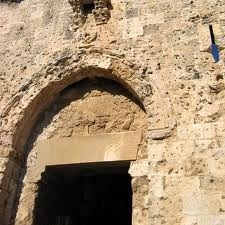 Intifada fans can breathe a little more easily.
Intifada fans can breathe a little more easily.Just when it seemed as though no amount of building in Israel’s settlements and harsh statements at the United Nations by the country’s foreign minister could truly provoke new violence between Israelis and Palestinians, the Jerusalem municipality came up with something guaranteed to steam up some hotheads.
The city’s planning committee is considering a proposal to build an underground parking lot for the Old City by breaching the 16th-century walls of Suleiman the Magnificent and digging into the rock beneath the ancient Jewish Quarter.
“This is illegal,” said Ghassan Khatib, director of the Palestinian Authority’s government media center in Ramallah. “These illegal changes would provoke the Palestinians and many others, Muslims and Christians. This will aggravate the tension between Israelis and Palestinians and have a negative effect on current international efforts to renew the political process.”
Over the years, Palestinians and Islamists have called for violence to protect, as they put it, the Old City from alleged Israeli plots to undermine it and bring the Aqsa Mosque, considered the third holiest shrine in Islam, tumbling down. Such conspiracies always seemed somewhat far-fetched, though nonetheless effective for all that.
This time, Jerusalem’s city government seems set on mirroring some aspects of the most vivid Palestinian paranoia.
For the rest of this post, read my blog The Man of Twists and Turns.<\a>
Published on October 11, 2010 05:59
•
Tags:
aqsa-mosque, armenian-quarter, christian-quarter, dung-gate, ghassan-khatib, global-post, herod-s-temple, intifada, israel, israelis, jaffa-gate, jerusalem, jerusalem-municipality, jewish-quarter, journalism, kotel, muslim-quarter, new-gate, old-city, ottoman-empire, palestine, palestinians, planning, ramallah, ruth-lapidoth, suleiman-the-magnificent, turkey, unesco, zion-gate
Bethlehem upbeat for Christmas
 For the first time in years, the people of Bethlehem have something more to celebrate at Christmas than the recollection of an important birth in their town 2,000 years ago.
For the first time in years, the people of Bethlehem have something more to celebrate at Christmas than the recollection of an important birth in their town 2,000 years ago.After the city’s economy was devastated by the Palestinian intifada over the last decade, Bethlehem’s economic recovery has picked up pace in the last year with gross domestic product rising by 9 percent. This Christmas the city’s streets are packed with tourists and pilgrims, and if the holy family were to arrive today they would, once more, discover that there’s no room at the inn — Bethlehem’s hotels are filled to capacity.
Locals see this as an important marker on their road back to normality. “Tourists are coming. Things are all right in Bethlehem,” said Walid Zawahra, a taxi driver.
Zawahra stood beside his yellow Mercedes cab, watching tourists pour through the massive gate in Israel’s security wall around Bethlehem. The gate is opened only once a year, for Christmas, so that the Roman Catholic Patriarch can enter in procession with his entourage from Jerusalem. The rest of the year, visitors must pass through a smaller entrance at the nearby checkpoint.
Security remains a factor, however. The streets beyond the gate were closed to traffic. Palestinian security forces were out in force on the roads around Rachel’s Tomb, which Jews believe to be the site of the burial of the biblical matriarch and where Israeli soldiers still stand guard. The tomb, which has taken on the dimensions of a fortress in the last decade, is a frequent point of friction between the soldiers and Palestinian rioters, and the authorities don’t want Christmas marred by any violence.
The Church of the Nativity, which stands over the site of Jesus’s birth, opened Friday after a 24-hour security closure, as police swept it for bombs before the Patriarch’s arrival for Midnight Mass.
In Manger Square, outside the church, two new cafes have been doing a bumper business, hosting local families and tourists late into the night. A stage built against the buttresses of the Armenian monastery at the front of the church hosted live musical performances in the evening.
The Bethlehem area also has something novel to entertain its young people — namely, something to do after dark. Until recently, youngsters in Bethlehem complained that their city shut down at twilight. Two night clubs opened in the last few months in the largely Christian district of Beit Jala. One of them is named Taboo, because it serves pork and, therefore, contravenes the proscriptions of Islam by which most West Bank restaurants operate.
Read the rest of this post on my blog The Man of Twists and Turns.
Published on December 25, 2010 01:45
•
Tags:
arabs, beit-jala, bethlehem, christians, christmas, global-post, intifada, jesus, journalism, manger-square, middle-east, nativity-church, palestine, palestinians, rachel-s-tomb, roman-catholic, west-bank



